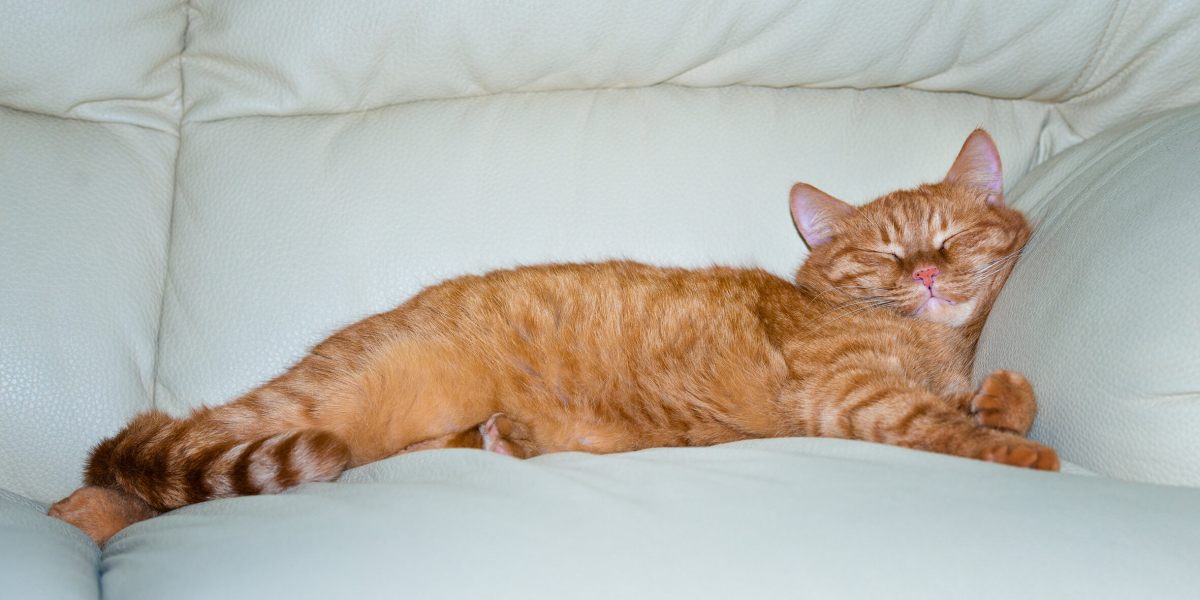
For many pet parents, snuggling up at night is one of the perks of having a cat in the family. After all, who needs a hot water bottle when you have a cute little kitty ready for a warm bedtime cuddle?
Some cats enjoy cuddling up with their humans in bed all night, but others prefer their own space at night for many reasons. If you think your cat might enjoy sharing your bed, there are a few strategies you can try to encourage them to sleep there. If your cat simply doesn't enjoy sleeping with you, respect their desire for their own company or a certain place to sleep.Key Takeaways
But not all cats feel the same, and some prefer their own space at night. Reasons your cat chooses to sleep elsewhere are diverse and may not be as simple as you first think. In addition, you should consider the pros and cons of sleeping with your cat before embarking on a new bedtime routine.
Let’s explore the top 6 reasons that your cat chooses not to sleep with you:
1. Your Cat Likes Their Own Company
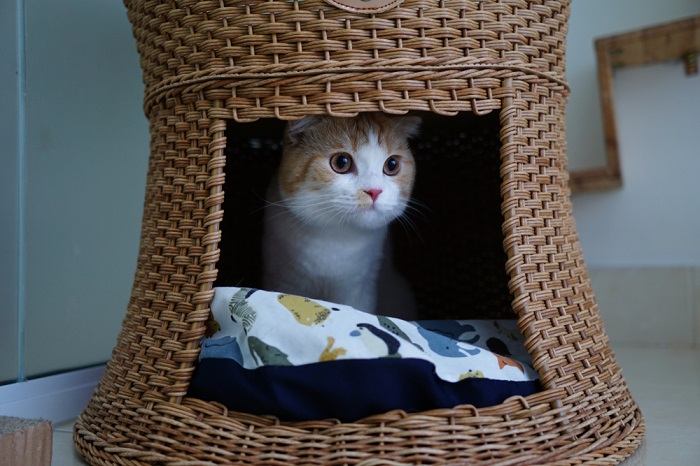
Some cats prefer to be in their own space rather than cuddle.
When looking at their wild counterparts, we might think of big cats sleeping with their pride and finding comfort in the presence and protection of others. But wild cat species are often solitary creatures, and some domestic cats feel exposed and unsafe if sleeping with people.
Do you have a cat that likes to hide in cardboard boxes or sleep in their litter box? Don’t worry, this is entirely normal. Often, that feeling of being enclosed and hidden away can make them feel more relaxed and safe. A study found that cats with hideaways slept better, were less anxious, and as a result, appeared more social with people.
Also Read: Why Do Cats Sit On Squares?
2. Your Cat Feels Safer Up High
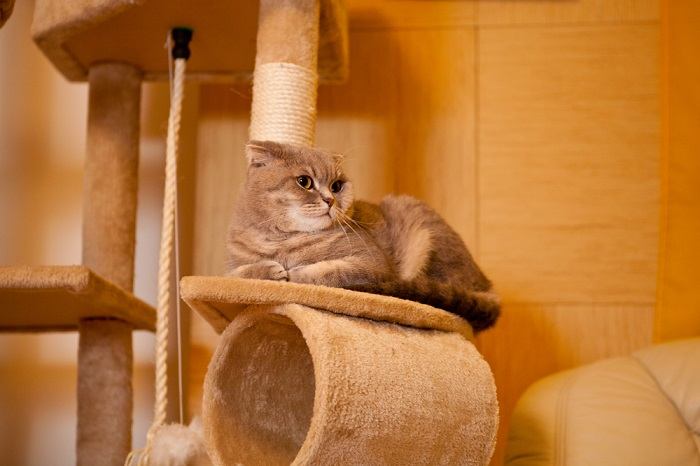
Cats often prefer to sleep somewhere high up, where they can easily see approaching threats.
Lone sleeping is not the only evolutionary trait you might observe. Some cats appear compelled to sleep in high places. If you have a low bed, your cat may prefer to lie on top of a tall closet or a cat tree.
Again this is a cat behavior that can be observed in wild cat species that might choose to sleep in trees in specific environments. From this high-up vantage point, there is plenty of time to spot and react to threats. Plus, hopefully, he might go completely unnoticed and slumber in peace all night!
Also Read: Best Cat Window Seat & Perches
3. Your Sleeping Habits Aren’t Synched
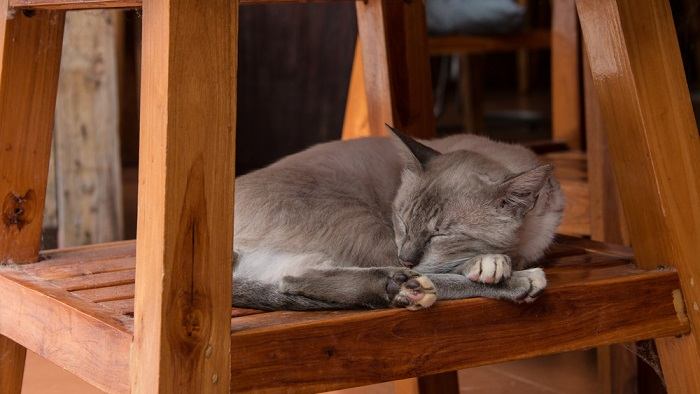
Cats most active at dawn and dusk, and less active during the day.
Remember, while you spend your day dashing about from one errand or meeting to the next, your cat is at home reveling in the peace and quiet. The daytime is the perfect time to catch up on some proper napping before the evening action.
European wildcats—our cat’s closest living wild ancestors—are known for their solitary nocturnal behavior. But, contrary to popular belief, domestic cats are not nocturnal. Instead, they appear to be able to adapt their sleeping patterns to fit their environment.
Moreover, more studies are emerging that describe the crepuscular activity of cats. This means they are most active at dawn and dusk, and less active during the day. This trait appears less prevalent in indoor cats. Outdoor cats may be avid hunters at twilight as many prey species are active at these times. Perhaps this explains why your cat is not as tired as you when the sun starts to set. Maybe for him, this is when the fun begins!
Also Read: Why Do Cats Lie On Uncomfortable Things?
4. You’re Not A Good Bed Buddy!
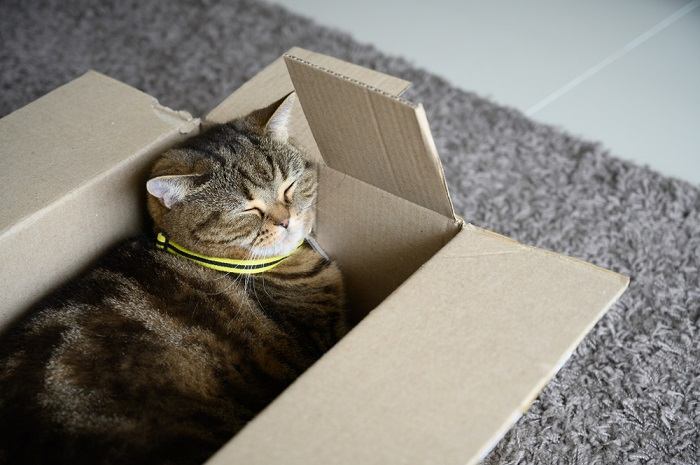
Some cats are less tolerant of excessive tossing and turning in bed.
It seems obvious, but some people just aren’t great nighttime companions. Perhaps space is limited, you’re a snorer, or you just fidget way too much! Cats loves their sleep, and lying next to a wriggly, hot, comforter-encased human might not cut it for them. As we know, cats are discerning souls that have their own ideas.
Your cat might prefer a cooler nighttime environment away from the glow of your body temperature. Or maybe they’d rather be somewhere with less bedding to get bundled up in. Whatever the reason, your cat might be more comfortable elsewhere. Offering multiple options to your cat can be a brilliant way to improve their well-being.
Also Read: Why Do Cats Curl Into Balls When Sleeping? A Veterinarian Explains
5. Something Else Is Bothering Them
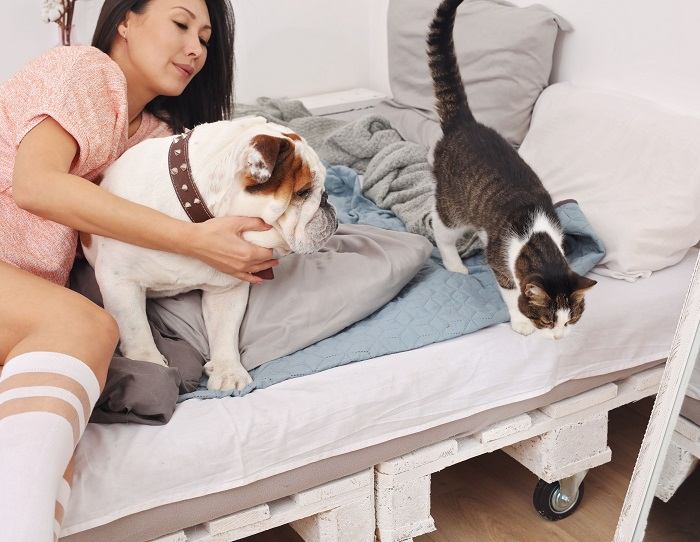
If your dog usually sleeps in your bed, your cat might feel uncomfortable and sleep elsewhere.
Sometimes a solid negative association can condition our cats to show avoidance behaviors. If something terrible has happened when your cat has slept in your bed before, they might be anxious to try again.
Perhaps there was a loud noise, or something else scared them. If you have other animals sharing the sleeping space, this might also feel stressful for your cat. Cats can be territorial with others, and dogs might be inclined to chase cats. No one wants to be sleeping with one eye open, so often, it is easier to set up camp in safer quarters where all outside threats are removed.
Also Read: How To Get A Dog And Cat To Bond
6. It’s A Physical Struggle
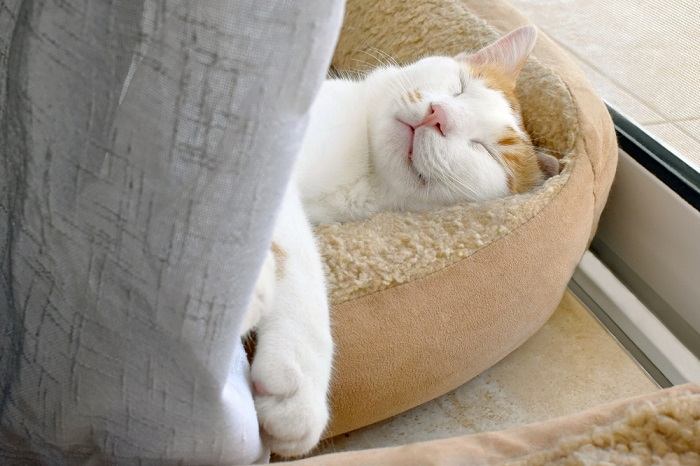
A senior cat with arthritis might have pain that makes them less included to hop up onto your bed.
Old age is not just a human condition. Older cats suffer many ailments that people experience. Osteoarthritis is a massive issue for aging cats. Arthritis can cause joint pain, stiffness, and a decline in your cat’s agility. Climbing onto furniture, particularly beds, can be challenging and could even lead to falls.
Cats can also suffer from brain aging (also known as cognitive dysfunction) and poor vision, which can severely impair their mobility and confidence. Some conditions, such as high blood pressure and hyperthyroidism, can leave your cat restless or continually asking for food. Your cat might meow at you to tell you something is wrong.
If your cat is elderly and their sleeping habits have changed, consider providing a comfortable cat bed at a lower level, or offer a ramp or pet stairs leading up to your bed. This will allow your cat to safely return to their usual sleeping spot on the bed.
As your pet ages, you can do lots of things to help. The first step is to speak with your vet, who can perform a general health screen and check for any signs of pain.
Also Read: What Can You Give A Cat For Pain? 6 Vet-Recommended Options
Final Thoughts
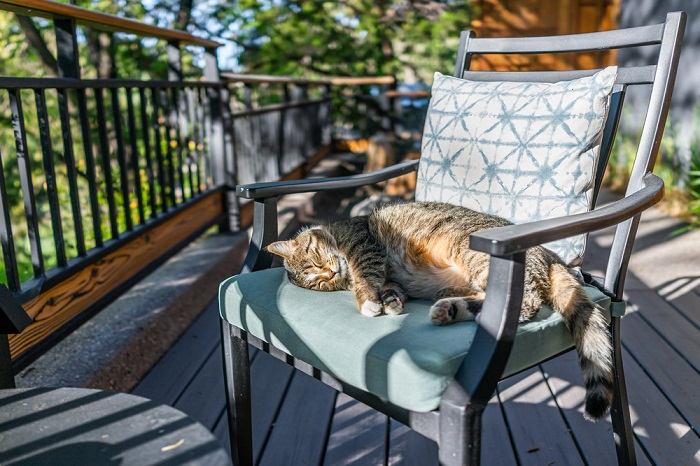
Taking a snooze with your trusted kitty by your side can be a calming and reassuring experience.
Taking a snooze with your trusted kitty by your side can be a calming and reassuring experience. But if your cat is less inclined to spend the night in your company, don’t be offended.
Coaxing your cat to spend more time with you might work, but some cats take comfort in their own company or a special safe space when they sleep, and this behavior should be embraced. Giving your cat different bedtime options will reduce stress and enrich their environment, making you the best pet parent possible!
Also Read: How Cats Choose Their Favorite Person?
Frequently Asked Questions
How do you get a cat to sleep with you?
You can do many things to tempt your cat to sleep in your bed with you, but ultimately, giving your cat the freedom to choose for themself is important.
If you think your cat might enjoy sharing your bed, here are a few things you can try to encourage them:
- Make the bed appealing: Place your cat's favorite toys or a covered cat bed that they love on your bed.
- Warm up the bed with a pet heating pad: Remember not to let it get too warm and to remove it before your cat goes to bed.
- Keep your cat busy in the daytime and evening with multiple playtimes: That way, they might feel ready for a good night's sleep when you do.
- Have cuddles before bedtime: Remind your cat that you give the best snuggles.
- Place treats or catnip on the bed: –This will encourage your cat to stay there and instills positive associations.
- Provide mobility aids to elderly cats: A ramp, pet stairs, or a low stool can help them to climb up and down more easily.
Are there benefits if my cat sleeps in my bed?
Research shows that around half of pet owners share a bedroom with their pets, and a large proportion share their beds. This has been likened to co-sleeping with children, bringing many benefits to you and your cat.
You might get great comfort from co-sleeping, enhancing your special bond, alleviating loneliness, and even improving emotional regulation. Your cat might also draw reassurance from your nighttime presence, lying close to your face, kneading at the bedding, or letting out a soft purr. This can be the perfect opportunity to spend quality time together.
If your cat is tucked up safely with you, this also removes any danger the outside world might present if they were out roaming in the middle of the night. And spending so much time together means you know your cat's every quirk. If something is amiss, you'll be sure to spot it as quickly as possible.
What are the risks of sleeping in bed with my cat?
Unfortunately, there are also risks associated with co-sleeping with any pets. Zoonoses are diseases people can contract from animals, such as bacterial infections, fleas, and other parasites.
It is difficult to control the spread of disease in these situations because cats are oral groomers. However, if you know your pet has an infectious disease, this is a sensible time to ensure offer them other sleeping options. If you are immunosuppressed or undergoing chemotherapy, you must seek advice from your medical doctor to make the safest plan.
-
Overgaauw PAM, Vinke CM, Hagen MAEV, Lipman LJA. (2020). A One Health Perspective on the Human-Companion Animal Relationship with Emphasis on Zoonotic Aspects. International Journal of Environmental Research and Public Health. 17(11), 3789. Retrieved October 10, 2022.
-
Smith BP, Hazelton PC, Thompson KR, Trigg JL, Etherton HC, Blunden SL. (2017). A Multispecies Approach to Co-Sleeping : Integrating Human-Animal Co-Sleeping Practices into Our Understanding of Human Sleep. Human Nature. 28(3), 255-273. Retrieved October 10, 2022.
-
Stella JL, Croney CC. (2016). Environmental Aspects of Domestic Cat Care and Management: Implications for Cat Welfare. Scientific World Journal. 6296315. Retrieved October 10, 2022.
-
Zhang Z, Li Y, Ullah S, Chen L, Ning S, Lu L, Lin W, Li Z.(2022). Home Range and Activity Patterns of Free-Ranging Cats: A Case Study from a Chinese University Campus. Animals. 12(9), 1141. Retrieved October 10, 2022.



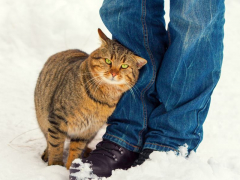
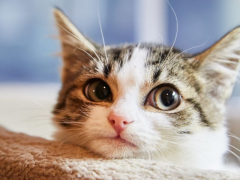
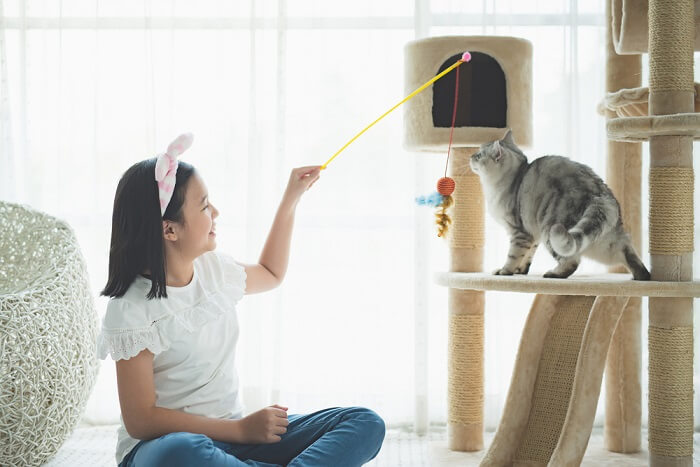
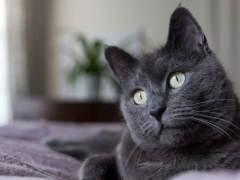

I have a 15-year-old Bengal that every night after I go to bed (I sleep on my side) sometimes it’s immediately sometimes an hour or so later. He will touch my arm or the side of my face with his paw. When he does I move my arm and lean back he then lays down against my chest right under my armpit. This happens every night. If I put my hand on him he generally stays next to me all night.